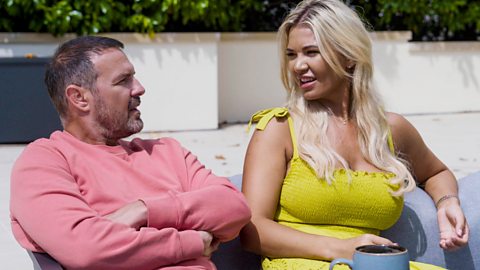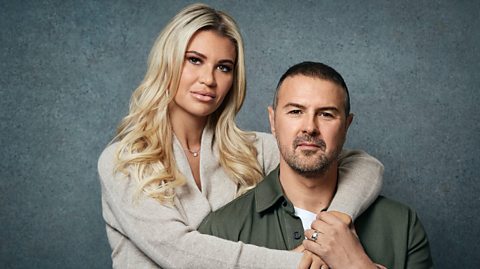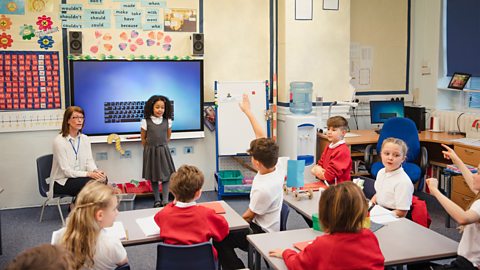Christine McGuinness is probably best known as a model and TV personality, but the 33-year-old faced a personal revelation when she was diagnosed as autistic this year.
The diagnosis came about during a new documentary Our Family and Autism where she and husband, Paddy McGuinness share what it’s like raising three autistic children.

During the programme, Christine and Paddy wanted to know why all their children received a diagnosis. Paddy and Christine both did a questionnaire that's designed to highlight autism spectrum traits. Christine’s score suggested she wasn’t neurotypical and while the AQ test isn’t a diagnosis, Christine wanted answers.
“I did kind of need that confirmation because I kept questioning myself” she says. “It’s an identity thing that I just felt like I needed to know for sure.”
Christine went to see Dr Simon Baron-Cohen - a clinical psychologist and professor of developmental psychopathology at the University of Cambridge - to confirm the diagnosis.
“We spoke about [my] childhood, we spoke about the struggles at school, we spoke about difficulties socialising.”

Masking
It turned out Christine had been displaying signs of autism for many years:As someone in the public eye, Christine is often seen at red carpets events appearing cool and calm in front of the camera. However, she was very uncomfortable. She describes it as like being a swan on water.
“You're really calm and you're smiling and you're floating around the room. You try and make conversation but inside, like the feet under the water, inside I feel like I'm constantly rattling.
“I'll be questioning why am I in this room? Why am I with these people? Are they going to speak to me? Oh, God, please don't speak to me. I have a million conversations going on in my head”
By appearing swan-like - Christine is doing something called ‘masking’.
Masking is a kind of coping mechanism neurodiverse people use to adapt to a neurotypical world. It’s a way of ‘blending in’ when in fact they feel overstimulated or overwhelmed and anxious. They’re hiding their true feelings.
“When I go to a hotel, I’ll rearrange the furniture - will move pictures off the wall, if I can. There's a hotel that I go to quite a lot, and it has a book on a table, and the books always open. And I instantly just go in and close the book. And I don't know why, it doesn't make any difference, but I feel better. If I was with my husband, I wouldn't do that.”
Masking is more common in women than men and can make it harder to spot autism traits.
“Girls will often have more well-developed social skills and more likely to have friendships” says Dr Sarah Lister Brook.
Sarah is a clinical director at the National Autistic Society and diagnostic specialist with the charity's Lorna Wing Centre for Autism. They’re known for their expertise in diagnosing women and girls.
She says this sort of masking develops because girls are often more motivated to try and fit in.
“They put on this sort of persona, which means that their social difficulties underneath are less obvious and no one's really aware that they're struggling.”
Relief and insight
These patterns matched Christine’s experiences perfectly and answered so many questions for her.
“To actually be told that I am autistic just made everything fall into place. I realised that basically what I'd been doing my whole life was acting. It's exhausting trying to juggle everything. I was extremely emotional, but relieved.”
She now uses her unique insight as an autistic mum to understand her children’s needs better as she shares a lot of traits with her children - including over-stimulation - that can be triggered by many things.
“I'm very particular. I don't really like certain fabrics, things with seams, I don't like high neck things. I tend to wear the same kind of style of clothes."
It affected the ways she and Paddy decorated their home.
“I wanted everything really quite plain and basic and just white, and I don't like patterns on carpets. Now I understand it - that is because it's over-sensory.”
Many autistic people struggle with over stimulation of their senses. These sensory differences can affect how they feel and behave.
Difficulty in processing information causes stress and anxiety. This can result in withdrawal, distressed behaviour, or meltdowns. This goes for food, too.
Eating
Some autistic people may have a limited diet. Again, it’s a sensory thing.
“I don't really like anything wet. I don't like anything that smells, or it's got too much flavour and with too much colour. So, things that you're supposed to eat: your broccoli, your carrots, and things like that I really struggle with”
Milder flavours are less stimulating and so make it a more comfortable experience to eat.Christine has experienced this all her life but was around 8 or 9 when she began to avoid meals. She reduced her food intake so much that she was diagnosed with Anorexia as a teenager.
“But it was nothing to do with body image” , she says. “It's not that I don't like food, it's just that I’m very, very particular in what I eat.”
This makes her more sympathetic to her children’s own food aversions and she works towards varying their diets. She can also help them cope better in school.
Christine’s children attend a mainstream school, and she works with them to ensure they feel calm and supported.
“If they're not comfortable in the canteen, I need somebody to provide a quiet area where they can eat. When I didn't eat at school, I ended up with an eating disorder.”
The kids have had their own personal breakthroughs.“I'm really, really proud to say that they eat in the canteen with everybody else,”
There is advice about autism and eating on this page from the National Autistic Society.
Schooling

It means a lot to Christine that their school is open to supporting her childrens' individual needs. She didn’t have the same experience.She, like many other autistic people struggled to be around lots of other children. It was overwhelming and over stimulating.
“I was quite often labelled naughty. I was quite often in detention. I'd skip school. I'd wander the streets because I found it too much to actually be in the school.”
Christine eventually left school at 14 but doesn’t want her children to go through the same things she did.
“I can help the school.”, she says. “Nobody ever questioned why I was behaving the way I was.”
Celebrating autism
Ultimately, Christine wants the documentary to show autism depicted in a positive light:
“Of course, there are challenges, and there are really difficult times. But we wanted to show autism as it is for our family. We didn't want it all doom and gloom, because I think there’s a stigma with autism anyway, that we want to change.”
She’s very proud of how far her children have come.
“Although they do need support, we also want them to be independent, and we don't want them to rely on having an adult with them all the time. They're very, very young, and they do still need a lot of help. But you've just got to remember to ask for help when you need it.”
Her own diagnosis doesn’t change anything for her or her family. If anything, it brings them closer together.
“I want them to just kind of know that they're just a bit like mummy, and mummy's doing okay, and that they will be fine, too.”
While Christine is unsure of what the future will bring, it’s important to celebrate and share these victories in the hope that it will help others.
“I've chosen to be a voice for them and use my platform and try to do some good with it…and it just shows with the right help and support and right understanding anything is possible.

If you wish to learn more about autism - this NHS site may help.
This BBC Action Line page offers links to organisations that can support parents.

Parents' Toolkit
Fun activities, real-life stories, wellbeing support and loads of helpful advice - we're here for you and your child.

Stories and advice about parenting and autism. collection
A collection of articles with tips for parents of autistic children - covering diagnosis, schooling and personal stories

Paddy & Christine McGuinness - Our Family and Autism: Advice for parents
Paddy and Christine McGuinness have 3 autistic children - their experiences may help parents who're looking for, or have received, an autism diagnosis for their child

Schooling tips for parents of autistic children
Advice to help parents of autistic children navigate school life. With tips for parents of children in mainstream and special schools.

Special Educational Needs and Disabilities collection
All of the Starting Primary School content featuring advice and stories for parents of children with SEND.

